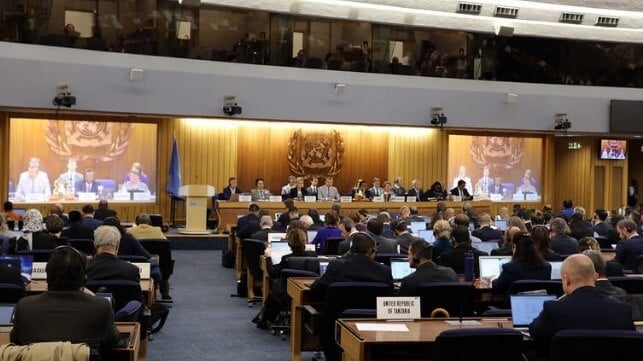IMO Makes Progress but MEPC Leaves Critical Decisions Ahead

The International Maritime Organization wrapped up two weeks of meetings working towards its environmental goals to reduce or eliminate carbon emissions by 2050 with a sense of progress while many critics worried that key decisions are still being pushed “down the road.” The fear is that they are setting the stage for a final, epic battle at the April 2025 meeting which is expected to ratify the new MARPOL text.
First in an Intersessional Working Group and then the general sessions for MEPC, member states worked to reach a full draft text for the MARPOL amendment. Everyone agrees that while a framework appears to be coming together, there is a large amount of work remaining and still no clear consensus on key elements.
“While several proposals remain on the table, there is more clarity on the differences between them and a willingness from member states to understand each other’s position,” said Angie Farrag-Thibault, Associate Vice-President, Global Transportation at the NGO Environmental Defense Fund which has an observer role at the IMO.
The key elements that remain open with several competing designs for the pricing of carbon emissions to encourage the fuel transition as well as a fuel standard. The feeling however is that a consensus is forming around a flat or universal GHG pricing mechanism. Supporters argued that it is stable and produces predictable revenues that can be used to incentivize the transition and close the gap with alternative fuels.
The universal approach that seems to have an emerging consensus establishes a per ton of CO2 emitted fee. However, a variety of designs for a flexible alternative are competing.
Dr. Tristan Smith, Professor of Energy and Transport at the UCL Energy Institute commented at the conclusion of the session today, “Investors looking to the levy to support business case for early adoption of new technologies and particularly e-fuels, and member states looking to the levy for support for a just and equitable transition, should be optimistic based on this meeting.” Smith however also admitted that there is “still a lot of work to be done.”
The International Chamber of Shipping also welcomed the further progress while continuing to advocate that a universal pricing mechanism has the best chance of succeeding. It agrees that a broad agreement has emerged for the need to reduce the cost gap with conventional marine fuel. The ICS however concluded, “Much more work still needs to be undertaken by governments before this ‘Net-Zero Framework’ is ready to be approved at next year’s critical MEPC meeting.”
Attendees and observers however note that it was the first time that the integration of the three critical elements emerged. In addition to the pricing mechanism, there was extensive debate on the proposed Global Fuel Standard and discussion on the required revisions of the Carbon Intensity Indicator (CII).
The Clean Shipping Council, another NGO pressing the IMO for action, expressed concern that there was “a lack of urgency” around strengthening the energy efficiency measure. They are advocating for the revisions to the CII and concluded by saying “There is a disturbing lack of progress on making the hard choices.”
Some issues seemed to be gaining strong acceptance. MEPC for example moved for the adoption of two new Emission Control Areas in the Canadian Arctic and Norwegian Sea. There was also support for steps to regulate black carbon emissions to reduce the impact on Arctic seas and glaciers. This is the polar fuel standard. The session also addressed a range of topics from scrubbers to underwater noise, plastics, and shipbreaking.
“A lot of work and cooperation will now be needed to resolve the many elements in the economic and technical measures before the political negotiations can progress to conclusion in 2025,” said the EDF’s Farrag-Thibault.
During the coming months the member states will work to refine the details of the measures and observers hope the consensus will emerge to make adoption possible in April 2025. Two-thirds of the member states that have ratified MARPOL will need to agree for the revisions to be adopted. The plan calls for adoption at MEPC 83 in April to meet the IMO’s revised strategy with the step down in emissions by 2030, 2040, and finally 2050.
